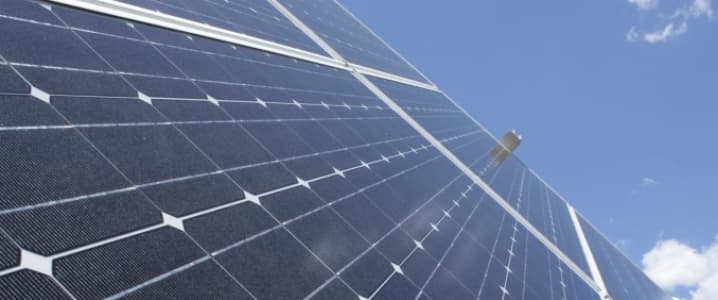In recent years, the world’s biggest banks have come under increased pressure from investors to adopt specific actions to fight climate change, promote ethical and sustainable financing, and cut exposure to lending to polluting businesses such as coal mining and coal-fired electricity generation.
Many banks have responded by committing billions of dollars in support of green projects and pledging to cut their own carbon footprint in line with the United Nations’ Sustainable Development Goals and the Paris Climate Accord. Some have also vowed to cut exposure to fossil fuel funding.
The latest bank to jump on the ‘green’ bandwagon is Spain’s BBVA that pledged this week to help mobilize US$122.7 billion (100 billion euro) in green finance, sustainable infrastructures, social entrepreneurship, and financial inclusion through 2025 under its Pledge 2025 program. BBVA also promised that 70 percent of its energy consumption will be from renewable sources by 2025, and that it would cut its CO2 emissions by 68 percent.
In line with its commitment to transparency, the bank said that its total exposure to fossil fuels is 3.4 percent of its total assets of US$28.7 billion (23.37 billion euro).
“Pledge 2025 will help the bank align its activity to a 2ºC Scenario and strike a balance between sustainable energy and fossil fuel investments and is based on three lines of action: financing, management and engagement,” the Spanish bank said. Related: Iran Could Lose 500,000 Bpd If Trump Trashes Deal
According to the Financial Times, BBVA will also stop financing new coal mines and coal-fired plants, stop funding exploration and production in the Arctic or from tar sands, asbestos extraction projects, or non-certified palm oil producers.
Still, BBVA’s Global Head Responsible Business, Toni Ballabriga, told the FT that the Spanish bank would exempt from these commitments countries that depend on imports for more than 70 percent of their energy. This, for example, would allow BBVA to continue to finance coal projects in Turkey, an important market for the bank.
BBVA’s past practices of lending have drawn media attention.
Last year, the bank came under fire from environmental and non-profit groups because it is part of the group of 17 lenders that has financed the controversial Dakota Access Pipeline. BBVA issued a statement in March 2017 in which it said that “The bank also conducts a detailed evaluation before making financial decisions, carefully screening for compliance with applicable laws and regulations. The Dakota Access Pipeline project finance transaction was evaluated under these guidelines.”
ShareAction, a non-profit group promoting responsible investment which BBVA has consulted in drafting its green financing initiative, warmly welcomed the bank’s pledges.
“The bank’s new policies would mean that BBVA would now rank 7th in our climate ranking of the 15 largest European banks, rather than 12th previously. This is a huge step forward in a very short space of time, and will hopefully set an example and illustrate to other banks what is achievable,” said Sonia Hierzig, banking project manager at ShareAction.
ShareAction’s ranking shows that BNP Paribas is the clear leader in Europe. BNP Paribas, France’s biggest listed bank, said in October 2017 that it would no longer do business with companies whose main business is exploration, production, trading, or marketing of oil and gas from shale or tar sands projects. BNP Paribas also said that it wouldn’t finance any oil or gas exploration or production projects in the Arctic region.
In November, banking giant HSBC also pledged to boost sustainable and green financing by US$100 billion to combat climate change. The group also vowed to reduce its exposure to thermal coal and actively manage the transition path for other high-carbon sectors, including by discontinuing financing of new coal-fired power plants in developed markets and of thermal coal mines worldwide.
Earlier last year, JPMorgan Chase announced a US$200-billion clean energy financing commitment and said it would use renewable power for 100 percent of its global energy needs by 2020. Related: U.S. Rig Count Inches Higher As Canadian Rig Count Slips
As early as in 2016, JPMorgan Chase announced prohibition on financing for development of greenfield coal mines and on financing of new coal-fired power plants in high-income OECD countries, and committed to reduce its credit exposure to companies deriving the majority of their revenues from the extraction and sale of coal.
In one of the strongest signals yet that financing for fossil fuels is increasingly under review among the banking industry, the World Bank said in December 2017 that it would stop financing upstream oil and gas projects after 2019 as part of its support to countries to meet their Paris Climate Agreement targets.
The World Bank will only make exceptions to consider possible support for financing upstream gas “in the poorest countries where there is a clear benefit in terms of energy access for the poor and the project fits within the countries’ Paris Agreement commitments.”
Faced with increased pressure from investors and a general global drive toward ‘greener’ brand images, more banks are sure to announce commitments and targets to combat climate change in the coming years.
By Tsvetana Paraskova for Oilprice.com
More Top Reads From Oilprice.com:
- MIT's Miracle Energy Breakthrough
- U.S. Sanctions Could Be The Final Nail In The Coffin For Venezuelan Oil
- Investors Demand A Payday: Do Shale Companies Agree?


















